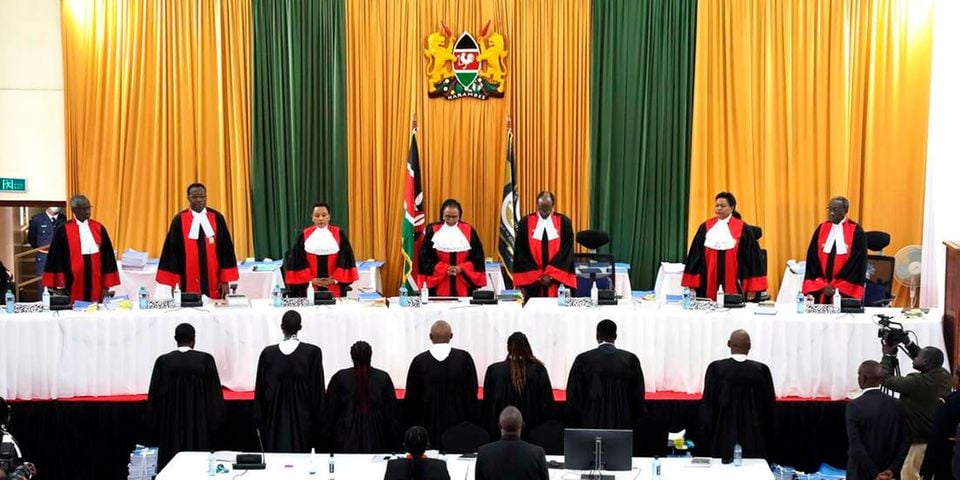Even as the supreme court by majority allowed the registration of an organisation to champion gay rights, justices Mohammed Ibrahim and William Ouko sharply disagreed.In their minority decision, which does not count as the court’s final ruling, the two said the government cannot allow registration of an organisation whose mission was furthering an illegality.
They said the NGO Co-ordination Board was right in its decision to reject the five names proposed by Mr Eric Gitari for registration of an organisation –Lesbian, Gay, Bisexual, Transgender, Queer or Questioning (LGBTIQ)-- to champion the rights of persons in Kenya.
Mr Gitari sought to reserve for registration of the NGO in any of the names: “Gay and Lesbian Human Rights Council”; “Gay and Lesbian Human Rights Observancy”; “Gay and Lesbian Human Rights Organization”; “Gay and Lesbian Human Rights Commission”; “Gay and Lesbian Human Rights Council and Gay and Lesbian Human Rights Collective”.
Justices Ibrahim and Ouko, in their dissenting judgment, observed that the decision of the NGO Coordination Board was primarily to be the prevailing penal system that outlaws acts that may be associated with the proposed names.
“In the face of Sections 162, 163 and 165 of the Penal Code, it is unfathomable how Mr Gitari would have been expected to proceed to reserve a name or register an association whose proposed name or whose expressed objects are in furtherance of activities that are contrary to or inconsistent with the law,” said the judges.
Since Mr Gitari was not ready to review the name and objectives of the proposed organisation so as not to offend the provisions of the law, the two judges said the Board’s refusal decision met the constitutional and legal threshold of reasonableness, rationality, proportionality and procedural fairness.
They added that in terms of Article 47(1) of the Constitution and various provisions of the Fair Administrative Action Act, the courts cannot escape from asking whether a public body like the NGO Coordination Board in a similar situation, on the material before it, could have reached the same decision.
The said decision to reject the proposed names was not unreasonable, irrational, unlawful or disproportionate.
Observing the uniqueness of the name, the judges said the only obstacle between the proposed organisation and its registration was the two words, “gay” and “lesbian”. An organisation will be identified by its unique name and other attributes.
The activist was resolute that the words were the identifying mark of the proposed organisation and could not be abandoned.
Subject to limitation
The judges added that freedom of association and the right to form, join or participate in the activities of an “association of any kind” is not absolute and is subject to limitation.
They said the use of the phrase “any kind” intended by the framers of the Constitution and Kenyans did not mean to include associations whose activities are inconsistent with the Constitution or contrary to the law.
“There cannot be, for instance, a right to freedom of association to form, join or participate in the activities of an association whose expressed objective would offend members of a particular community, religious, ethnic or racial group or whose name is obscene, offensive, hateful, derogatory or defamatory; or to adopt names of a proscribed group,” the judges said.
Citing Article 36 of the Constitution, they said that there may be good reasons for withholding registration, hence the qualifying term, unreasonably.
The right, is for this reason not absolute, but subject to the limitations of Article 24.
The two dissenting judges went a step further and proposed alternatives to Mr Gitari that he could pursue to secure registration or an organisation with his choice of names.
Since the avenue of the courts decriminalising homosexuality is pending before the Court of Appeal at his instigation, the judges said a second alternative would be to rally the people of Kenya to pursue Parliament to amend the laws to repeal Sections 162, 163 and 165 of the Penal Code.
Other jurisdictions either through legislation or constitutional revisions have amended their laws to remove similar provisions including the United Kingdom in 2013, Scotland in 2014, Northern Ireland in 2019, Canada in 1969, and Australia in 1994.
They all amended their laws to remove similar provisions touching on homosexuality. Some countries such as South Africa in 2006 and Australia in 2017 went further to legalise same-sex marriages.
“Society's social opinions and concerns are continually changing. If the people of Kenya desire to have these laws removed from Statute, then legislators in their capacity as the voice of the people can enact, amend, and repeal these laws. However, until such time, Sections 162, 163 and 165 of (the) penal code remain in our statutes books as law,” they held.
LGBTIQ persons
The judges added that all human beings, including LGBTIQ persons, are entitled to the full enjoyment of all the rights under Chapter Four of the Constitution, not because of their sexual preferences as LGBTIQ but as human beings.
They said that in Article 27(4) the phrase sexual orientation was deliberately omitted by the framers because they only intended to guarantee the right against discrimination on the ground of female or male gender.
Last week, the majority judges Justices Philomena Mwilu (Deputy Chief Justice), Smokin Wanjala and Njoki Ndung'u said it would be unconstitutional to limit the right to associate, through denial of registration of an association, purely on the basis of sexual orientation.
Chief Justice Martha Koome and Justice Isaac Lenaola did not take part in the ruling as the CJ was part of the five-judge bench that handled the dispute at the Court of Appeal in 2019.
The bench comprised justices Koome, Phillip Waki, Roselyn Nambuye, Asike Makhandia and Daniel Musinga.
Lenaola was part of a three-judge bench that determined the case at the High Court stage in 2015.
The bench comprised Lenaola, George Odunga and Mumbi Ngugi. Odunga and Ngugi are now Court of Appeal judges. By Joseph Wangui, Daily Nation






